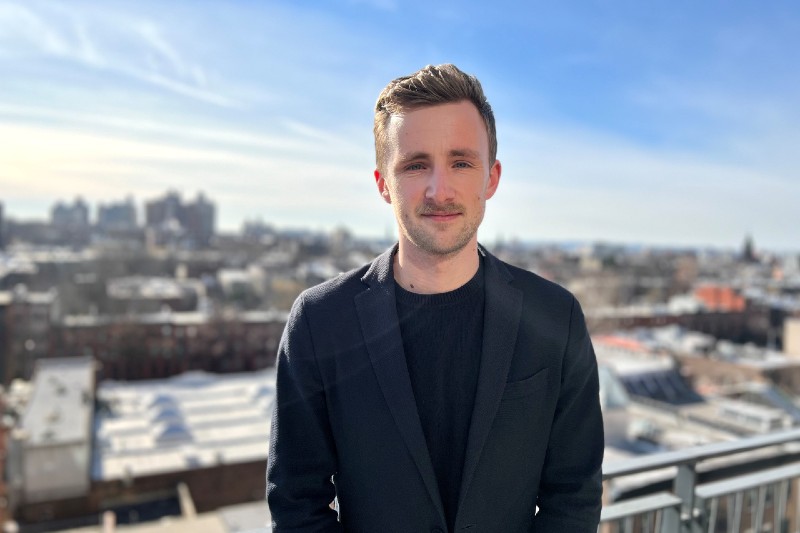
Most office workers will be familiar with the annual cycle of employee training. You log on to a website, read some module material, complete a quiz and you’re done. It’s a tried-and-tested (if somewhat uninspiring) format that peer-learning company Hive Learning are aiming to disrupt.
Founded in 2013 by rugby world cup winning coach, Sir Clive Woodward, and digital venture builder, Blenheim Chalcot, Hive Learning’s technology is based on a combination of network science and nudge theory – borrowing some of the principles that draw users into social media. Users of the platform can come together with their colleagues to learn about a wide range of topics, which cover everything from improving resilience in the workplace to becoming a more inclusive company.
Bristol alumnus Fred Moss (BA 2013) has worked at Hive Learning for seven years, during which time he moved to New York to set up the company’s US business. We caught up with him to learn more about life in the US and how Hive Learning is reimagining corporate learning.
What did you study at the University and what was your favourite thing about your course?
I studied Theology and Religion, which was really fascinating. My favourite thing about the course was the style of learning. We had lots of in-depth discussion time with our tutors which I really valued and we were able to be very independent with our studies. I also happened to live just behind the Theology and Religious studies building which meant I could get to my lectures in five minutes which was handy!
Could you tell me more about Hive Learning’s mission?
Ultimately, we’re on a mission to transform company cultures through peer learning. In universities that’s exactly how people learn: by talking to each other. But in the corporate world that can be difficult to do, so a lot of training tends to be designed around classroom-based or computer-based learning. We’re disrupting that through our peer learning platform which helps people to learn with each other wherever they are in the world, whatever job they’ve got.
Through our platform you can learn everything from how to be an inclusive leader to how to give feedback to someone in the workplace. Here in the US, we specialize in diversity and inclusion. We want to help businesses make sure that diversity and inclusion training isn’t just a box ticking exercise, but something that creates a real behavioural change. Our programme gives people simple, basic steps which can help them take more action towards inclusion, rather than just expanding their awareness of the topic. And just like in a university seminar, people learn in groups so everyone can quickly get on the same page about what ‘good’ looks like and feel accountable to each other.
How do users interact with the platform?
Most traditional learning platforms will continuously chase users until they complete their courses. The interactions you can have on our platform are much more engaging because they involve real experiences with other human beings. Our platform is available on desktop as well as a native mobile app. The app will notify you, for example, when your colleagues have commented on or accessed programmes that might be of interest to you. Everyone knows about FOMO – the fear of missing out – but through our platform we see the impact of FOBSMO – the fear of being seen to be missing out. Knowing that your fellow colleagues are taking action makes you want to put your best foot forward too.
How did you find adapting to life and work in New York?
People who have lived in New York for a long time say it takes about three to four years to adapt to the city. You either fall in love with its culture or you don’t. New Yorkers are very strong people and that comes across in the corporate world. People don’t beat around the bush here; they’re pretty open about what they feel is good and bad. That helps a lot in your early days starting up a business because you get very direct and immediate feedback.
You’re a member of the University of Bristol’s US Foundation Board. What do you hope to achieve together?
Practically speaking, being part of the board means attending meetings and bringing as much perspective as I can from a young growing business within the US. The work of the board aligns nicely with the work we’re doing to help the US become a more inclusive place because diversity and inclusion is also incredibly important to the longevity of the University of Bristol. We’re also very focused on sustainability which is a big priority for the University. Within the board I can give my perspective on those topics which is a really exciting opportunity.
Where in Bristol did you make your happiest memories?
I met my wife at Bristol so that’s a very happy memory! Some of the first-year memories of living in halls up in Stoke Bishop and going for long walks over the Downs with friends were also some of the best times. My wife and I hope to come back and live in Bristol in the future because we love the city so much. The benefit of hybrid styles of working is that living outside of London is definitely more of an option now.
How did studying at the University impact you as a person?
I think what university gives you is the ability to step back and learn how to solve problems independently. It teaches you how to think about something from your perspective and convey your thoughts. Alongside that I would say it’s given me a group of friends and a professional network that have both helped me massively.
To find out more about Hive Learning head to hivelearning.com
